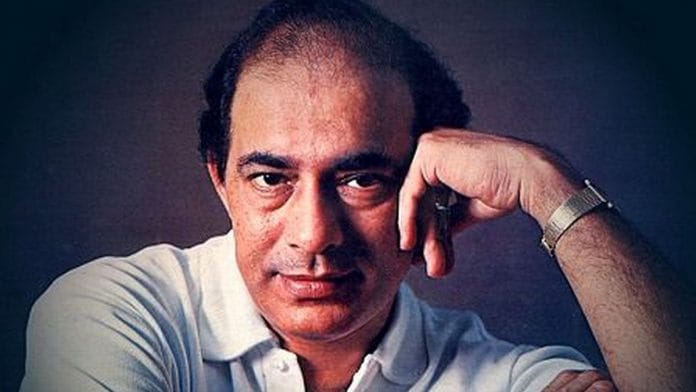New Delhi: About 18 years after he recorded his first song, Talat Mahmood sang ‘Jalte hain jiske liye’ for composer S.D. Burman in Bimal Roy’s Sujata in 1959. Loosely a ghazal, the song became a romantic anthem for generations to come, but for Mahmood, it became his identity. He was, from thereon, the ‘King of Ghazals’.
In his over four-decade-long career that ran parallel to legends like Mukesh, Kishore Kumar, Mohammad Rafi and Manna Dey, Mahmood rendered several semi-classical songs to great acclaim. The Padma Bhushan awardee even tried his luck at acting, and managed to deliver some hits.
On his 21st death anniversary, ThePrint takes a look at the life of the man behind the ‘Velvet Voice of India’.
Early life
Mahmood was born on 24 February 1924 in Lucknow to a “highly cultured but conservative family”, his son Khalid Mahmood writes on a website dedicated to his father’s legacy.
One among six children, he showed early signs of interest in classical music. The singer even attended the Marris College of Music, now the Bhatkhande Music Institute Deemed University in Lucknow for a brief period.
At the age of 16, he started rendering ghazals by Ghalib, Dagh and Mir, among others, for the All India Radio in Lucknow.
Music label HMV was quick to notice his rising popularity and signed him on to record his first disc, Sab Din Ek Samaan Nahi Tha, in 1941. He was 19 at the time.
Also read: Ustad Bismillah Khan, a Muslim who reveled in the sound of shehnai in Varanasi
Rise to prominence
The first big success for Mahmood came in 1944 when his non-film song, ‘Tasveer teri dil mera behla na sakegi’, became a smash hit.
The song took him to the film industry in Calcutta (now Kolkata), where he was based for about five years before moving to Bombay (now Mumbai). In Calcutta, Mahmood also acted in three films — Rajlaxmi (1945), Tum Aur Main (1947) and Samapti (1949).
His big break in Bombay came when he signed on to sing for Dilip Kumar in Shaheed Latif’s Aarzoo (1950). Composed by Anil Biswas, ‘Ae dil mujhe aisi jagah le chal’ started the “trend of filmi ghazal”, writes Khalid Mahmood.
From Naushad to S.D. Burman, Madan Mohan to Shankar Jaikishan, Mahmood sang for most leading composers of the time. Apart from Dilip Kumar, he also did playback for contemporary stars like Raj Kapoor, Ashok Kumar, Shammi Kapoor and Dev Anand.
He also acted alongside Dev Anand in the film Araam (1951) — one among the 10 films he worked in as an actor in Bombay. Of these, the most prominent was Dil-E-Nadaan (1953), directed by A.R. Kardar. The director was said to have launched an ‘All India Beauty Contest’ in search of a leading lady to play the heroine opposite Mahmood. The film’s music, composed by Ghulam Mohammed, was tremendously successful.
Among his other ventures, Mahmood also worked with Suraiya (in 1954’s Waris) and Nutan (in 1958’s Sone Ki Chidiya).
Mahmood sang 747 songs in 12 Indian languages and starred in 13 films, The Hindu wrote of him, calling him “Hindi cinema’s biggest singing star next only to Kishore Kumar”.
The wane
With his acting career not taking the expected flight, and the music palette shifting through the late 1950s, Mahmood reduced his workload, giving up acting completely.
His fall-out with composer Naushad also played a part in his wane in the film industry — the music director once found him smoking before the recording of a song in Babul (1950) and was so angered that he didn’t repeat the singer till 1968, the fag end of his career.
In the 1960s, Mahmood’s hits started waning, with romantic songs holding more appeal over his ‘slow’ ghazals. But the singer still managed to leave behind a couple of classics from the period, like the Jahan Ara (1964) song, ‘Phir wohi shaam’.
https://www.youtube.com/watch?v=BcHZxd_50gc
However, despite his lean period in the industry, he continued to be popular in different parts of the world, including the US, West Indies and Pakistan. In the US, he was often referred to as the ‘Frank Sinatra of India’.
Mahmood had married Nasreen (born Lalita Mullick) in 1951. The couple had two kids —son Khalid and daughter Sabina.
In 1992, over five decades after his first song, Mahmood was honoured with the Padma Bhushan, India’s third highest civilian award.
He died on 9 May 1998 — incidentally, five days before Sinatra’s death.
Also read: Lalita Pawar — Bollywood’s wicked mother-in-law who we all loved to hate






